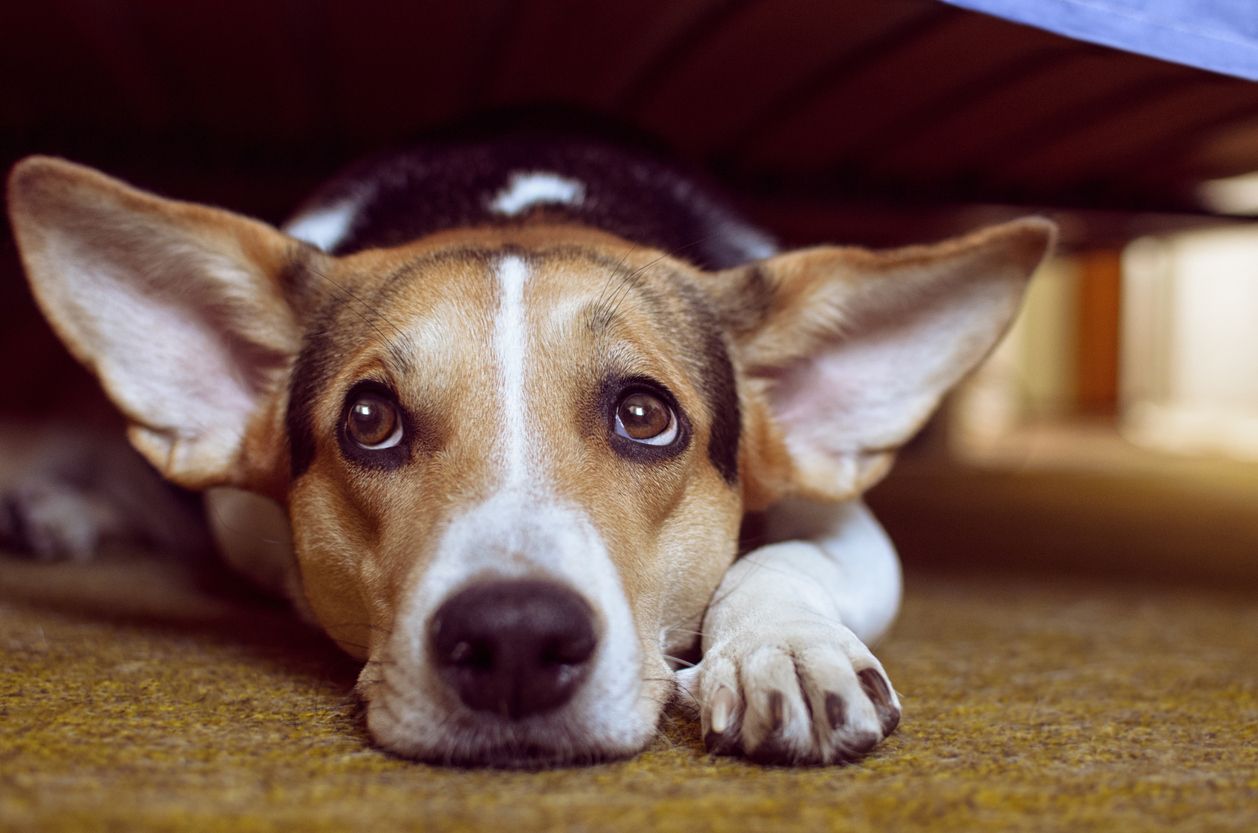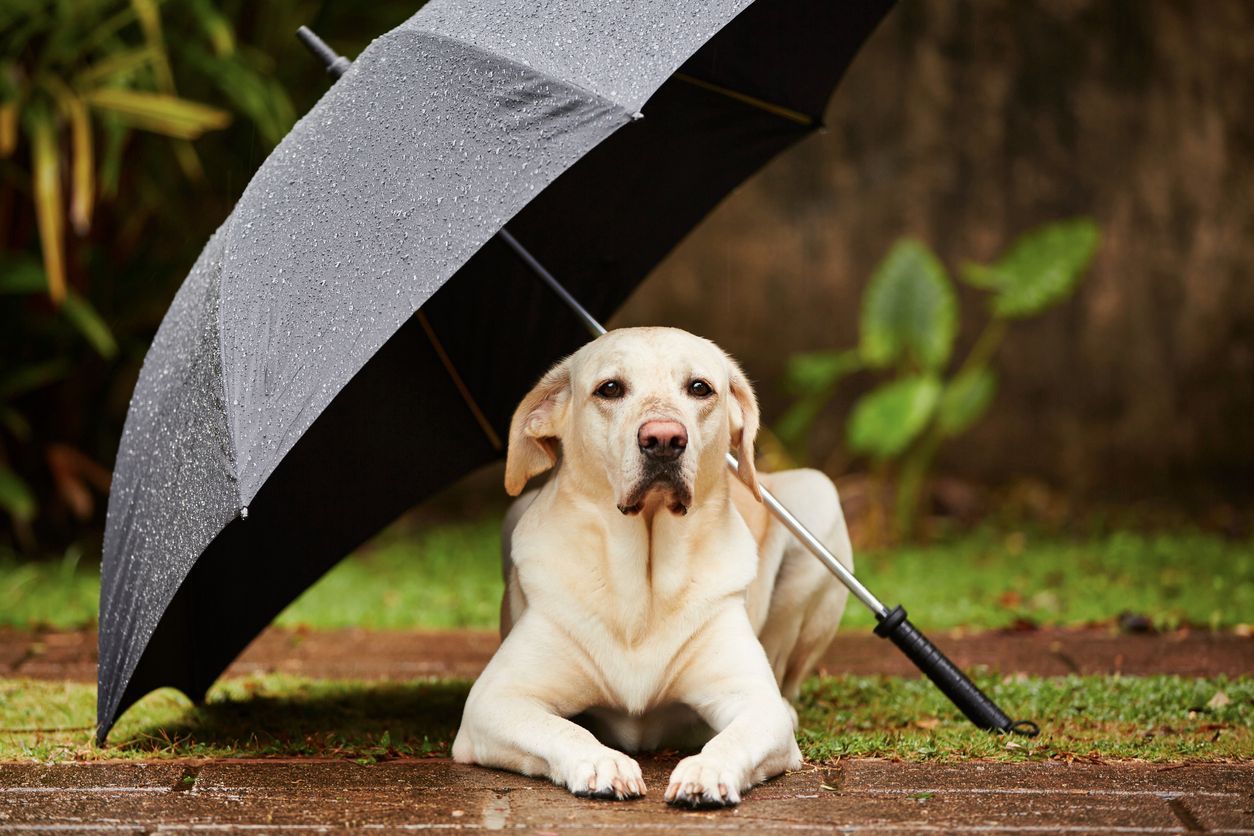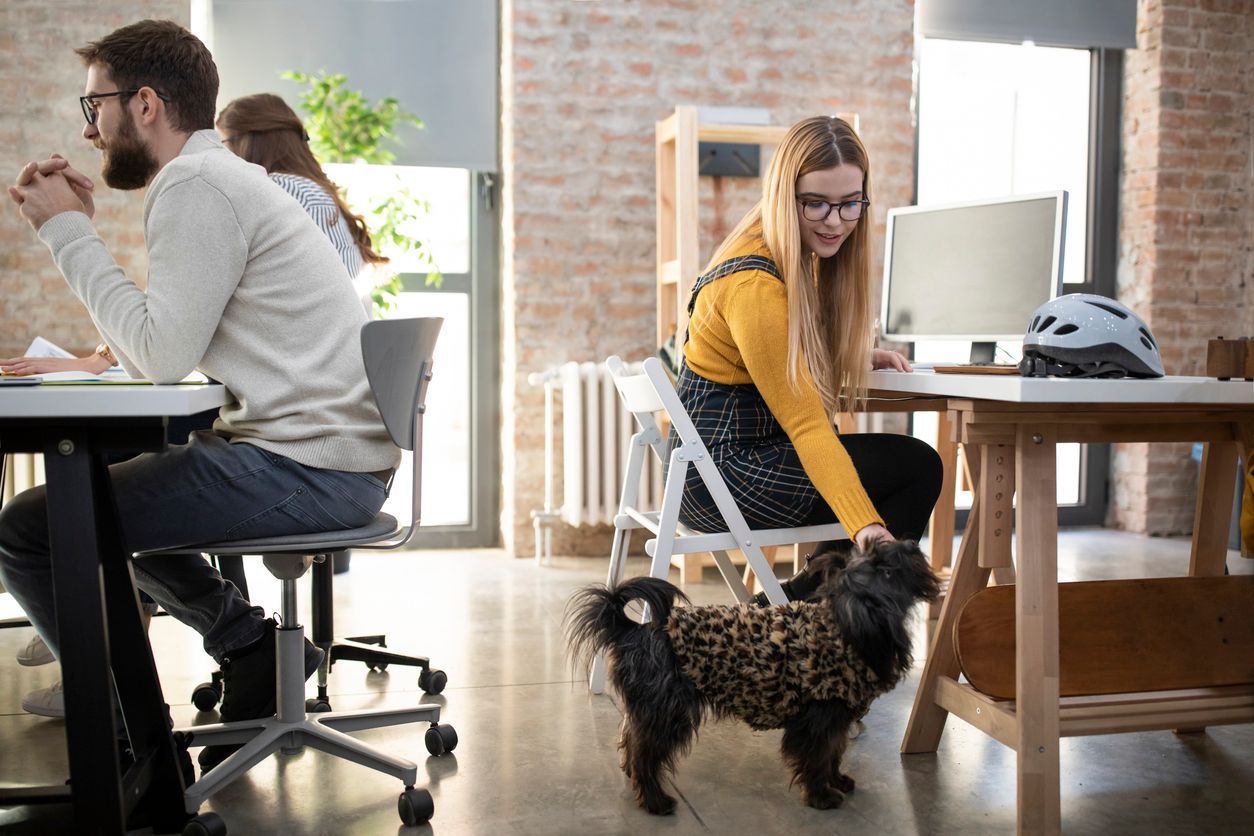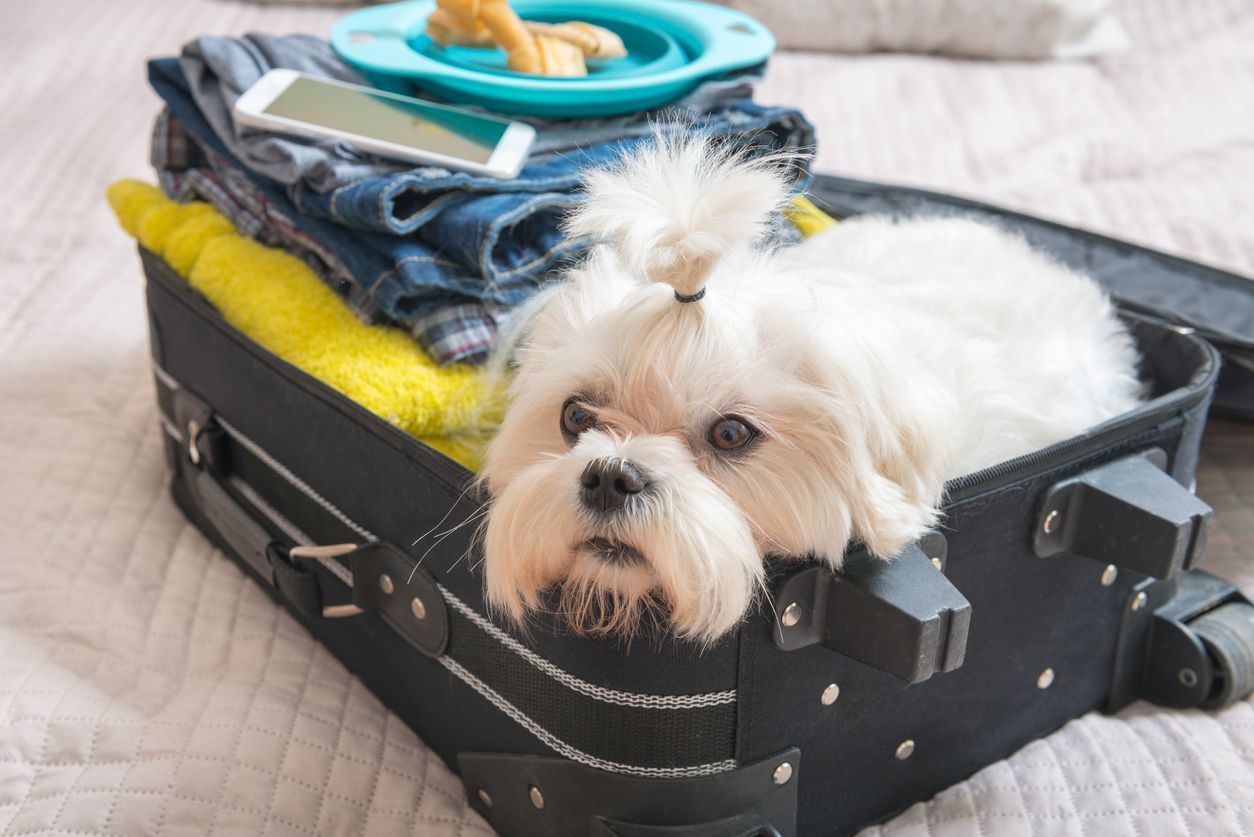How to help scared dogs during fireworks and thunderstorms
Key takeaways
- Mild signs of fear of loud noises that go unnoticed in dogs can progress over time, with some severely affected dogs showing anxiety long after the sounds stop. Others may develop a true phobia, which is known as noise aversion.
- In some cases, the panic caused by noise aversion can be hazardous, with severe fear and anxiety leading to escape, destructive behavior, self-injury, and other issues.
- It’s wise to address noise sensitivity early. Set up a safe space for your dog in advance, use calming aids as directed, and ensure your dog’s anxiety medication is refilled. Speak to your veterinarian if you’re concerned about your dog’s fears.

Fear of thunder, fireworks, and other loud noises is common in dogs. While some dogs show only mild signs of stress, others may develop a true phobia, known as noise aversion. The good news is there are proven ways to help your dog, and intervening with appropriate treatment techniques when milder signs of fear are detected can prevent more severe noise aversion from developing.
If your dog is fearful of loud noises, such as thunderstorms and fireworks, it may be helpful to talk to a vet about:
- Why your dog is afraid of loud sounds
- Why noise fears progress to anxiety in some dogs
- How to help your dog when they’re reacting to loud noises
- How to prevent your dog’s fears from getting worse
- When to talk to a vet about your dog’s noise aversion or phobia
Because every dog will respond differently to different treatment methods, working with a vet to create an individualized plan that combines environmental strategies, behavior modification, and, sometimes, medication is the most effective way to manage noise aversion in your dog. A virtual veterinary visit is a convenient way to discuss your dog’s fears and how best to treat and manage them in the long term.
Why are some dogs afraid of loud noises?
Genetics, past experiences, aging, and underlying medical conditions can all influence how strongly a dog reacts to sudden, unpredictable sounds. While many dogs recover quickly after being startled by a noise, some develop heightened sensitivity or anxiety over time. Factors that influence how distressed a dog becomes in response to loud events like fireworks or thunderstorms include:
- Normal canine sensitivity to sound
- Multiple sensory components
- Evolutionary and instinctive factors
Normal canine sensitivity to sound
Sound plays a major role in how dogs interpret their environment, and they can hear a wider range of sound frequencies than humans. Sudden, loud, or unpredictable noises, such as fireworks, thunder, or a car backfiring, can feel intense and startling. For some dogs, these noises can cause intense fear or anxiety.
Multiple sensory components
Fireworks and storms have sensory components other than sound, such as:
- Bright flashes of light
- Vibrations
- New or unusual odors
In addition, storms create atmospheric changes, like pressure shifts, static electricity, and wind. Many dogs sense these changes before thunder even begins, and these early changes in atmosphere can contribute to their fear.
Evolutionary and instinctive factors
Avoiding storms and other dangerous situations is an adaptive survival behavior in many animals, even when they live indoors. Storms bring risks, such as flash floods, lightning, and strong winds. Sensitivity to environmental cues may cause dogs to react instinctively even when the actual risk is low.
Why noise fears progress to anxiety in some dogs
Noise fears can progress to anxiety in some dogs when they’re repeatedly exposed to frightening sounds and their fear response gets stronger with each exposure.
It’s not fully understood why some dogs develop noise aversion and others don’t. Current evidence suggests a combination of learning, genetics, past experiences, and age-related changes in hearing or cognition may all play a role. As fear reactions repeat or intensify, dogs can become more sensitive to noise in general, a process called sensitization. Without early support or treatment, this growing sensitivity can cause a normal fear response to evolve into ongoing anxiety or even a true noise phobia.
The difference between fear and phobia
There’s a difference between a normal fear response and a phobia.
Fear is a normal reaction to a perceived threat, even if the threat is imagined. These reactions are short-lived and proportional to the situation. Fear is an evolutionary trait that helps dogs avoid danger, and it typically resolves once the trigger ends.
A phobia is an intense, irrational fear that’s persistent, disproportionate to the situation, and recognized by veterinarians as a behavioral medical condition. Phobias disrupt normal life and do not quickly go away after the perceived threat has ended. Reactions can occur even when the trigger is mild or absent. A phobia to loud noises is called noise aversion.
The key differences between fear and phobia lie in how the dog is impacted and how they behave. Dogs with phobias may panic, injure themselves, or attempt dangerous escape behaviors. Phobias rarely improve without intervention and often worsen over time, but early intervention may keep it from progressing.
Treatment for noise aversion focuses on helping dogs feel safer during loud events and reducing their overall sensitivity to sound. Treatment plans usually combine several approaches: environmental management to limit exposure to frightening noises; behavior modification techniques, such as desensitization and counterconditioning; and, when appropriate, medication to reduce fear and improve learning. Working with a veterinarian or credentialed behavior professional ensures the treatment plan is effective, tailored to the dog’s needs, and supports long-term improvement.
Signs your dog is scared

Early signs of fear in dogs include:
- Yawning, lip licking, or trembling
- Panting that’s not related to heat or exercise
- Pacing, restlessness, or hypervigilance
- Sudden drooling
Moderate signs of fear include:
- Hiding under furniture or moving to small interior spaces, such as a closet or bathroom
- Clinging to their owner or seeking reassurance
- Whining, barking, or attempting to get attention
- Refusing food, water, or opportunities to go outside
Severe signs of fear and panic include:
- Attempts to escape that could be dangerous, including clawing at doors or windows
- Destructive behavior related to panic, such as chewing their way out of a crate
- Involuntary urination or defecation
- Injuring themselves or other pets while trying to escape or hide
Some dogs react before triggering sounds begin, especially dogs with a fear of thunderstorms. This is called anticipatory anxiety and is often due to atmospheric changes, like dark skies, wind changes, static electricity, or barometric shifts. Dogs may pace, hide, or vocalize long before thunder is actually heard.
When signs suggest a phobia
Behavioral signs that may indicate a noise phobia include:
- Fear that persists long after the noise stops
- Reactions that interfere with daily life or cause self-injury
- Responses that intensify over time despite reassurance or environmental changes
Recognizing early or subtle signs of fear allows for timely evaluation and support. Tracking when behaviors begin, how long they last, and what triggers them can help veterinarians assess severity and develop an effective, individualized treatment plan. Documenting behaviors with notes or short videos is especially useful for the diagnostic process.
Early intervention with environmental management, behavior modification, and medication when needed can reduce the risk that a mild noise sensitivity will progress to a more severe or persistent condition.
How to help your dog’s fear of storms, fireworks, and other loud noises
There are various methods of treatment and management for noise fears and phobias in dogs. Different methods may be more effective than others for an individual dog, and some dogs may need a variety of management methods and long-term training to help them stay calm in stressful situations.
Provide a safe, calming environment
Offer your dog a safe haven in the home in the form of an interior room, basement, or crate with bedding and familiar scents. Interior rooms can help block noise, flashes of light, and other triggering stimuli. These safe spaces should have as little sensory input as possible: close doors and curtains to reduce sound and light in the room, and consider adding a white noise machine or calming music to help drown out the frightening noises. Soothe your dog with soft, slow reassurances. Dogs pick up on owner tension. Your own negative response, either to the noise or their behavior, can reinforce their fear and make things worse.
Some dogs may want to hide in closets or a dog crate when fearful. “If your dog feels safest in a closet with the door shut, it’s OK to leave them in there for the duration of the fireworks or storm,” assures Dr. Jo Myers. “It’s important for your dog to have access to this safe space when you are not home.” A long-lasting dog treat or toy may help distract fearful dogs once they are in a safe space; however, some dogs may be uninterested in food or play when they’re afraid.
Desensitization training
Gradual desensitization behavioral modification can be beneficial, but it takes time, consistency, and patience. Never punish your dog for being fearful, as this can make reactions worse in the future.
Desensitization starts by exposing your dog to recorded thunder or firework sounds at a volume low enough to avoid triggering anxiety symptoms while offering praise, treats, or play. Over time, the volume is gradually and incrementally increased, but always staying below the threshold that triggers anxiety.
Sound desensitization training can take several weeks to months before any improvement is seen, but some dogs can grow out of noise fears altogether. For best results, work with a veterinarian, professional dog trainer, or behaviorist.
Anxiety medication
Because it’s often easier to prevent fear from getting worse rather than calming a dog that’s already scared, your veterinarian may suggest giving your dog prescription anti-anxiety medications prior to a fear-inducing event. Short-acting anxiety medications can help during predictable events such as fireworks; long-term anti-anxiety drugs, such as SSRIs and clomipramine, may help dogs with generalized or year-round anxiety.
Sileo (dexmedetomidine hydrochloride oromucosal gel) is currently the only medication approved by the US Food and Drug Administration (FDA) specifically to treat noise aversion in dogs. It works by calming the nervous system to reduce fear and anxiety without causing heavy sedation, helping dogs stay more relaxed during loud events. Sileo comes as a gel that’s applied between the cheek and gums, not a pill or chew, so giving it correctly takes a little practice to ensure it’s absorbed properly. A virtual veterinary appointment can be a convenient way to talk through when to use Sileo, how to apply it safely, and what signs to watch for before and after dosing. Because timing and technique matter, your vet can also explain how far in advance to give it and when repeat doses may or may not be appropriate during ongoing noise events.
Calming treats and other over-the-counter products
Calming treats, supplements, and other over-the-counter (OTC) products are widely available, but the scientific evidence supporting their effectiveness is limited and results vary from dog to dog. Some dogs appear to benefit mildly, while others show no noticeable change at all.
Anxiety vests or close-fitting clothing may help soothe some dogs’ anxiety. Canine pheromones, which can come in the form of diffusers, sprays, or wipes, may also help. While anxiety wraps and pheromones have mixed evidence to support their efficacy, they’re unlikely to cause harm.
If your dog’s fear is strong enough that you feel the need to intervene, it’s worth seeking professional guidance rather than relying solely on OTC options. A veterinarian can help determine whether your dog needs a more comprehensive treatment plan, such as behavior modification, environmental strategies, or medication. This ensures your efforts are focused on approaches that are more likely to provide your dog with meaningful relief.
How to prevent your dog’s fears from getting worse
It’s best to address noise sensitivity early, as untreated fears often get worse over time. Plan ahead for triggering noise events by:
- Setting up your dog’s safe space so it’s ready when you need it
- Using calming aids or prescribed medications as directed
- Keeping routines predictable
- Avoiding punishment
- Refilling medications early
Make sure you have enough of your dog’s anxiety medication on hand before a predictable event, such as the Fourth of July. Don’t wait until the day before or the day of to get a refill. If your dog’s fears seem to be getting worse or aren’t improving, consider a consultation with a veterinary behaviorist.
When to talk to a vet about your dog’s noise aversion or phobia
It’s important for pet parents to talk to a veterinarian if:
- Fear is severe, escalating, or causing destructive or escape behavior
- Your dog stops eating, injures themself, or takes a long time to recover after the noise stops
- You’re unsure which calming options are safe or effective
A vet can assess your situation and create a personalized treatment plan. Treatment plans can look different for different patients, and it may take time to determine what’s most effective for your dog.
An online vet can offer behavioral consultations to evaluate your dog’s fear responses as well as provide insight on training and desensitization strategies. In some cases, they may be able to prescribe anxiety medications; this varies by location and is always up to the vet’s discretion.
Online visits allow veterinarians to provide:
- Stress-free behavioral consultations
- Support for prevention-focused planning
- Guidance on training and desensitization techniques
- Discussions on calming aids and medication options
- Support during and after noise events
Virtual care adds the most value when:
- An in-person visit may be especially difficult or stressful for the dog
- Owners want help identifying subtle early signs that may not be evident in a clinic setting
- Planning preventive strategies ahead of holidays, travel, or seasonal weather changes
- Ongoing monitoring and adjustment of a noise aversion plan is needed over weeks or months
FAQ - How owners can help a dog’s thunderstorm anxiety and fear of fireworks
Why are dogs afraid of fireworks and thunder?
Fireworks and thunder create loud, sudden, and unpredictable noises along with flashes of light, vibrations, and other environmental changes that many dogs find startling or threatening. Dogs also hear higher frequencies than humans and can detect subtle atmospheric shifts, which can intensify their reactions. Some dogs recover quickly while others develop stronger fear or anxiety in response to these events.
What helps calm dogs during fireworks?
Creating a quiet, secure space indoors and reducing exposure to bright flashes or loud sounds can help many dogs feel safer during fireworks. Some dogs also benefit from steady background noise, pheromone products, or anxiety wraps, although the evidence for these varies. If your dog shows significant fear, a veterinarian can recommend individualized strategies or medications that are more reliably effective.
Can dogs grow out of noise fear?
Some dogs show less fear of noises over time, but this usually happens because of training and supportive management rather than because the dog has grown out of it. Noise sensitivities often persist or worsen if not addressed. Working with a veterinarian or behavior professional on desensitization, counterconditioning, and appropriate environmental strategies can help reduce fear and may prevent the problem from escalating, even if a dog never becomes completely unbothered by loud sounds.
Disclaimer: This article, its content, and its related references do not constitute veterinary advice and should not be considered a substitute for veterinary care. If your pet is showing any symptoms that could indicate a medical emergency, please seek immediate emergency care.










